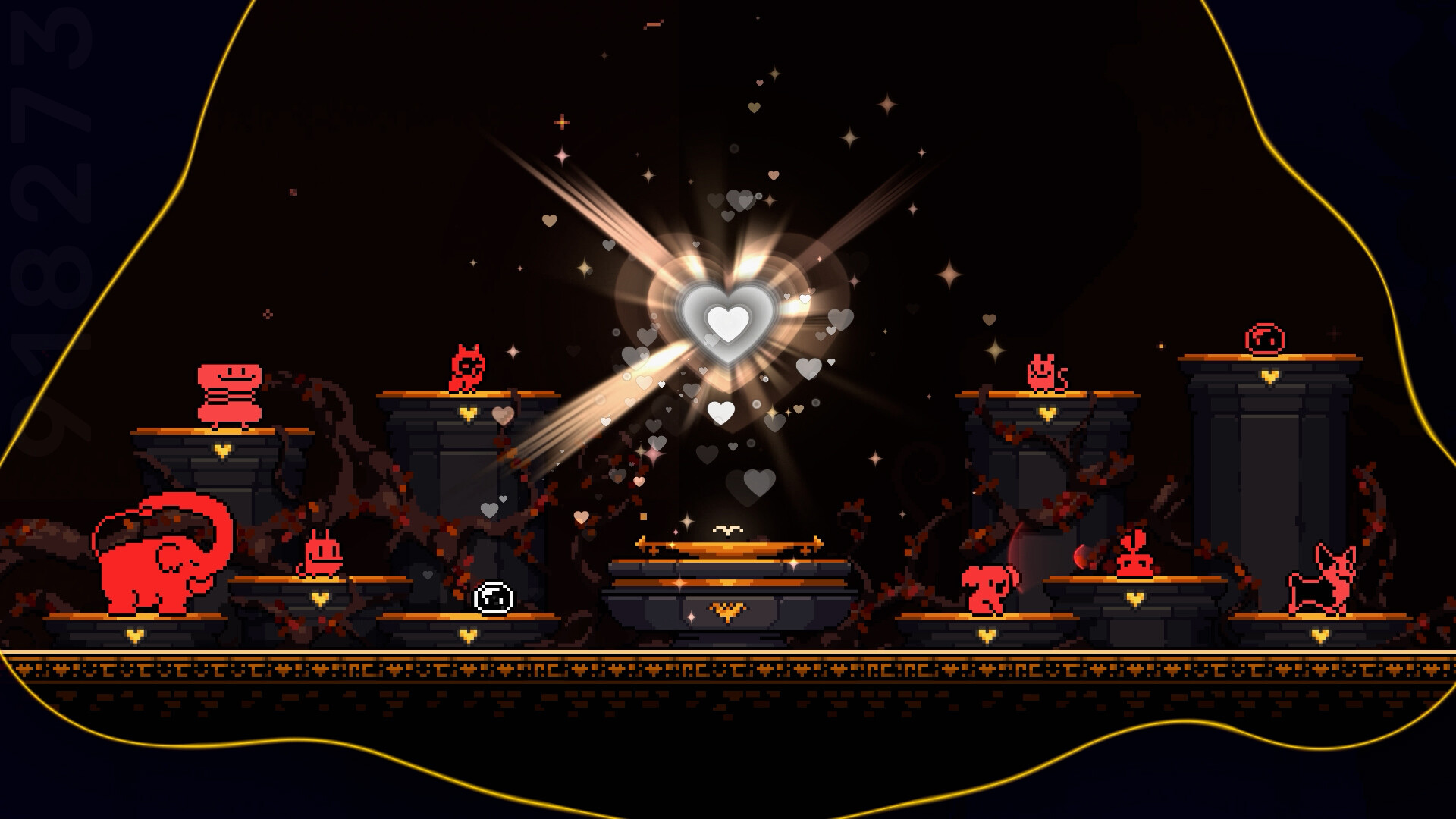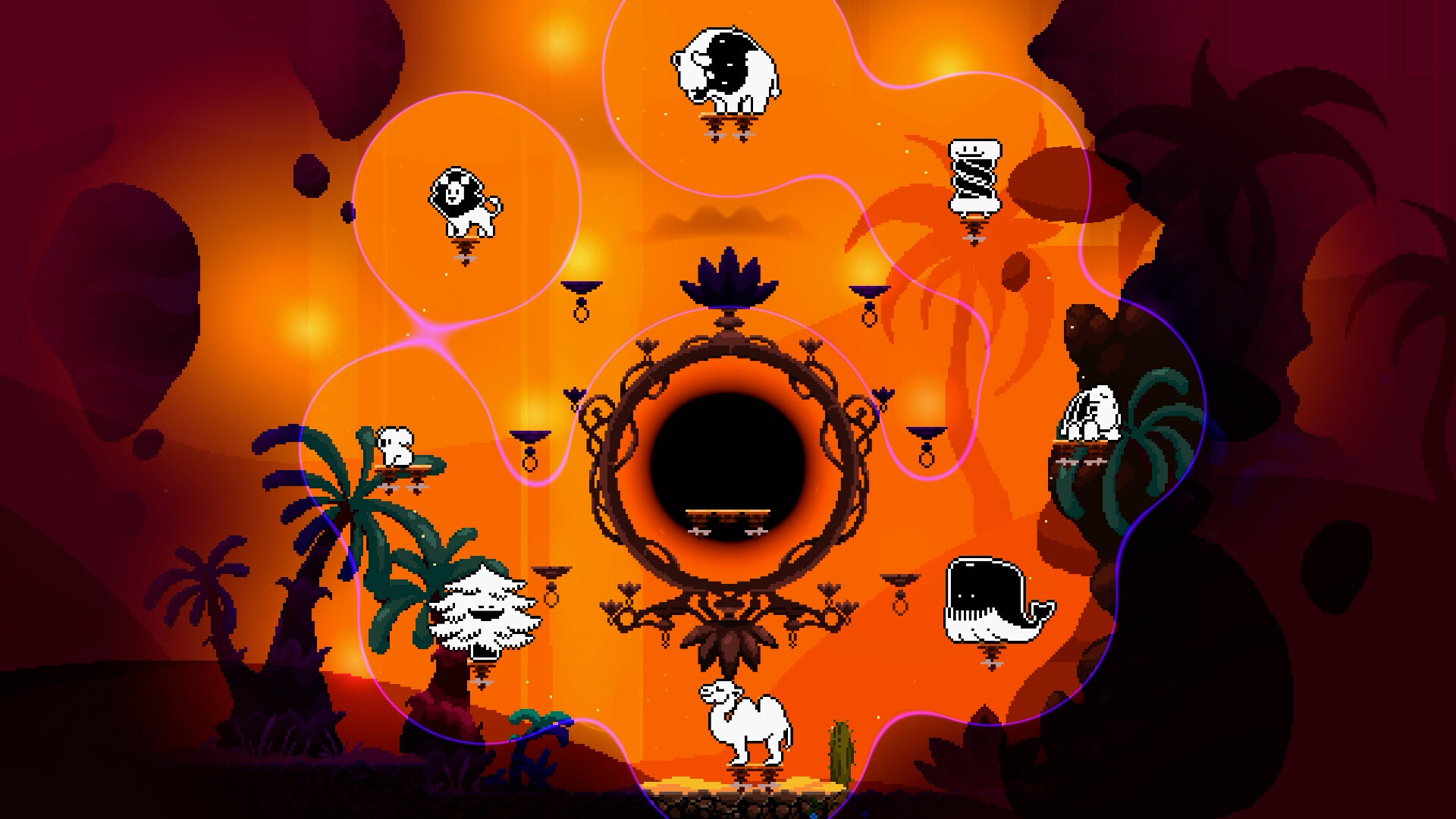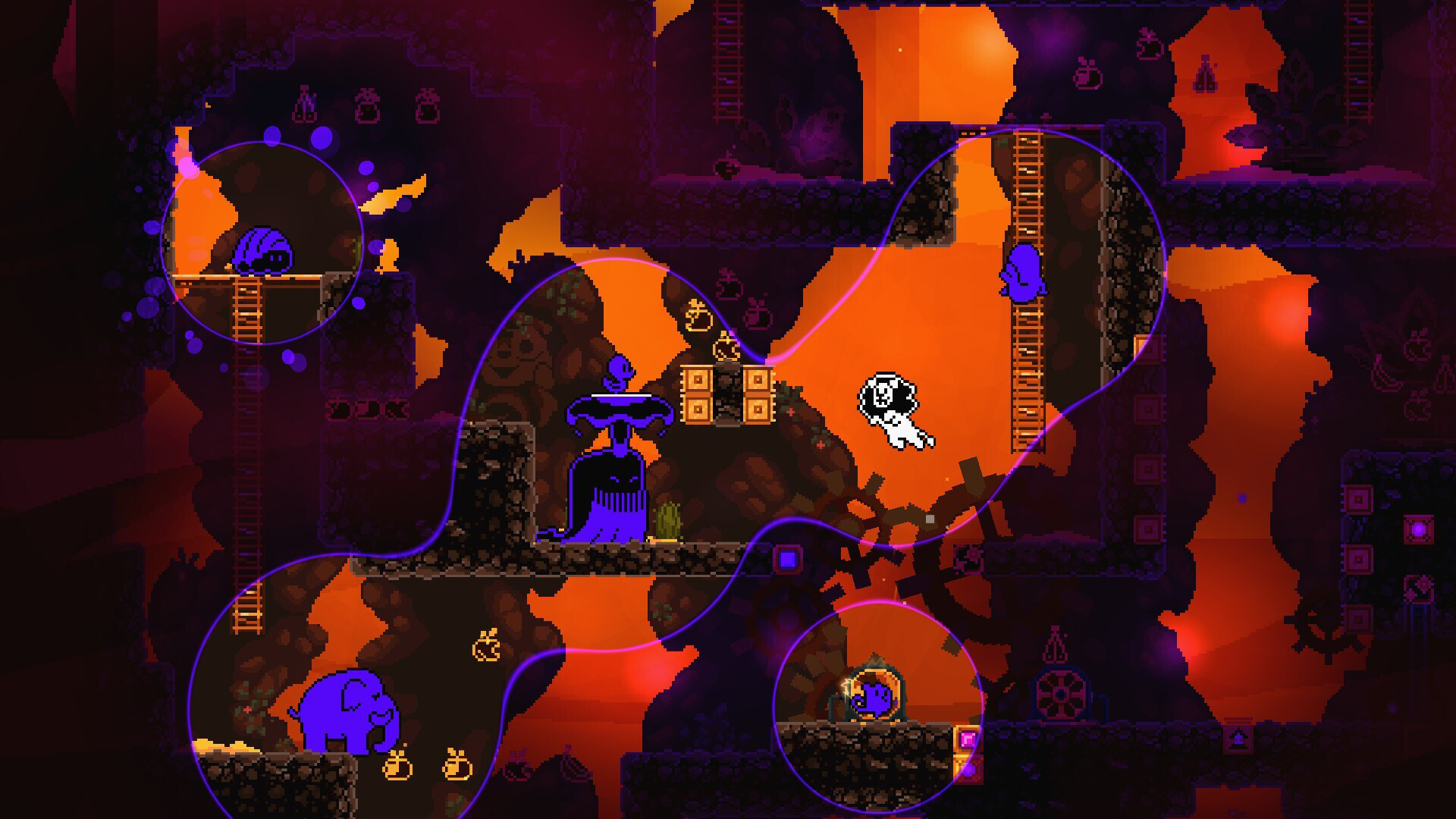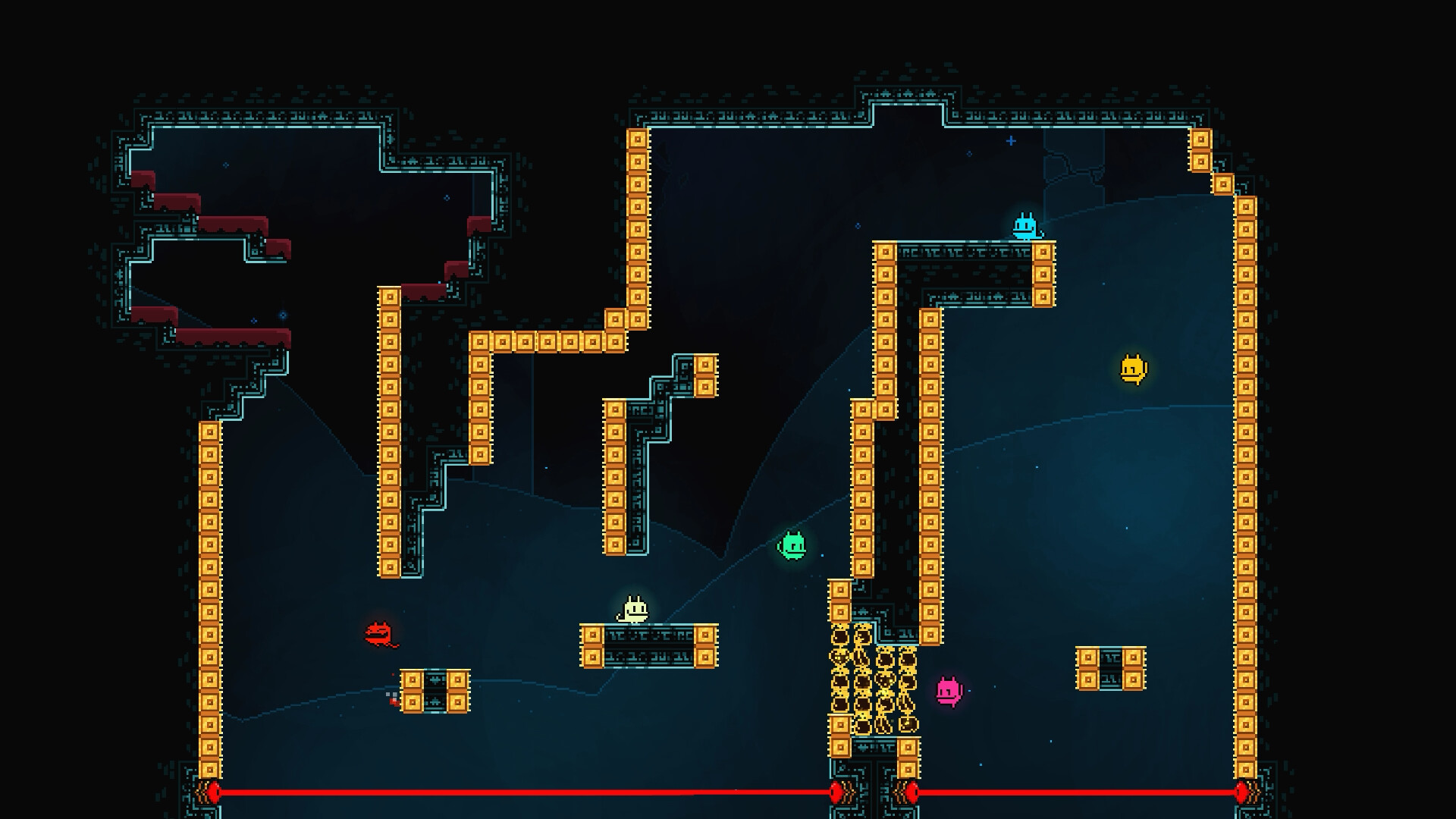Cozy indie platformer KarmaZoo taught me the meaning of friendship
What goes around comes around

KarmaZoo is the most wholesome game I’ve played all year. In this charming platformer from indie studio Pastagames, you play as a lost soul in the form of an adorable blob stuck in the cycle of Karmic rebirth. Your task is to navigate a series of well-constructed platforming challenges, to accumulate Karma - the game’s currency.
Intuitive enough to be family-friendly, but hectic enough to amuse even seasoned platforming veterans, KarmaZoo is an ideal holiday game, bursting with friendship, charm, and genuine human connection.
It’s a big task for a little blob, but the beauty of KarmaZoo is in how you’re never alone. The game’s elaborate platforming sections are designed for between two and ten players, requiring teamwork and cooperation. However, thanks to the game’s elegant mechanics, working with others feels like a joy rather than a chore.
Every player in KarmaZoo has a ‘halo’ which represents their life force. To sustain it, you need to pair up with another player and stay close. Should everyone’s halo fail, it’s game over. Immediately, your fate is bound to at least one other stranger somewhere else on planet Earth. As you journey through KarmaZoo’s psychedelic levels, you’ll quickly see that almost every mechanic requires teamwork. Levers need to be operated in sequence, lightning needs to be conducted from player to player to power up machines, and floating platforms need to be maneuvered with button presses. You’ll all need to pitch in to survive - a process that KarmaZoo makes fun and rewarding.

For instance, players have the ability to sing to transparent pieces of terrain, causing them to become usable. This creates adorable chains of singing blobs, serenading their environments as players leap from platform to platform. If you’re doing the singing, you feel like a vital member of the team, paving the way forward for your allies. If you’re the one jumping, however, you feel grateful and encouraged to pay forward the singing players’ kindness later on. This is the virtuous cycle at KarmaZoo’s heart which leads you to trust the strangers you’re playing with.
Beyond singing and firing free Karma at other players, there aren’t many ways to interact in KarmaZoo, but this doesn’t matter because the spirit of cooperation and altruism which suffuses the game does the talking for you. Nastiness and pettiness are given no room to grow.
All is one

When a multitude of people attempt to traverse the game’s levels at the same time, KarmaZoo’s puzzles become easier to solve. With ten people simultaneously attempting to solve any given challenge, your group is liable to arrive at a solution ten times faster. Sometimes, you’ll follow a more experienced player, grateful for their example, but, at other times, you’ll be the trailblazer, helping the team move forward and gaining a warm, fuzzy feeling in the process.
Sign up for breaking news, reviews, opinion, top tech deals, and more.
Should a player perish on the way, they’ll leave behind a helpful block where they fell which the next player can use to get a leg up, meaning that even dying in KarmaZoo helps your allies out. It’s a refreshing change of pace from the likes of League of Legends and Overwatch 2, where the slightest error can earn you the enmity of your own team in short order.
Should a player perish, they’ll leave behind a helpful block where they fell
After you complete a Loop, one of KarmaZoo’s self-contained co-op gauntlets of increasingly challenging levels, you return to a cozy sanctuary full of animal statues. Here, you can unlock new forms for your lost soul by spending Karma. Far from merely cosmetic, these unlock unique abilities, too. There are dozens of these for you to collect, each full of character. Whales are larger, leaving behind bigger blocks on death. They can also spout water from their blowhole, becoming a platform of their own. Lions have a wider singing range, frogs get a triple jump, and the umbrella form can unfurl, protecting its allies.
These different abilities synergize elegantly, rewarding you for creative co-op play. Umbrellas can create safe zones, allowing your lions to safely activate multiple platforms with their mighty roar. The compass form can point towards nearby fruit, while the pig uses their special ability to hoover up those precious collectibles at range. The vast majority of these abilities are so intuitive that no complex communication is required; it all just folds naturally into the flow of the game.
Enter the zoo

The same is true of the game’s competitive Totem mode. Reminiscent of WarioWare: Move It! and Mario Party Superstars, Totem mode will throw you into a series of bite-sized minigames where you’ll need to out-platform other players to achieve victory. Frantic mine-cart races, rapid descents, and frenzied sprints are commonplace here, each game ending quickly enough to prevent friction between players. You’ll often find yourself working in small, temporary teams, too, which helps this competitive mode convey the altruistic wholesomeness at KarmaZoo’s core. There’s even local multiplayer, making Totem mode ideal for in-person gatherings.
Frantic mine-cart races, rapid descents, and frenzied sprints are commonplace
Even when played alone, however, KarmaZoo has a warm, dream-like quality that makes it ideal for the holidays. Vibrant colors and the narrator’s cheery baritone help keep your spirit warm even during the game’s tougher moments. Even Loop mode’s game over screen is a strangely peaceful gust of wind that washes away the level, calmly depositing you back at the sanctuary.
Hazy and gentle, the game itself reminds me of Christmas. I can easily imagine myself curled up on the sofa, playing some KarmaZoo while in a pleasant, post-turkey daze. The platformer’s wholesome emphasis on human connection seems like a perfect way to mark what is for some, the coldest, darkest time of the year. The virtuous cycle of friendship and camaraderie central to the game perfectly complements the very best parts of the holiday spirit.
Want more wholesome times? Check our lists of the best co-op games and the best multiplayer PC games.

An editor and freelance journalist, Cat Bussell has been writing about video games for more than four years and, frankly, she’s developed a taste for it. As seen on TechRadar, Technopedia, The Gamer, Wargamer, and SUPERJUMP, Cat’s reviews, features, and guides are lovingly curated for your reading pleasure.
A Cambridge graduate, recovering bartender, and Cloud Strife enjoyer, Cat’s foremost mission is to bring you the best coverage she can, whether that’s through helpful guides, even-handed reviews, or thought-provoking features. She’s interviewed indie darlings, triple-A greats, and legendary voice actors, all to help you get closer to the action. When she’s not writing, Cat can be found sticking her neck into a fresh RPG or running yet another Dungeons & Dragons game.